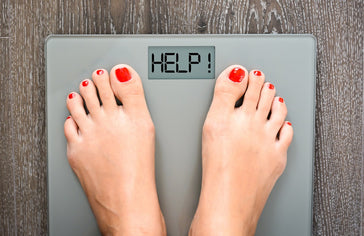Do You Have A Dairy Intolerance? Plus What To Do If You Do
Posted by Mike Miryala on
Hey everybody! It is Becky Williams and I am back with another bonus video for this week. This week we're gonna be talking about Dairy. This is one of the most controversial topics because especially in the keto space, because a lot of people will pile on a lot of dairy to their plate thinking okay this is keto because it's high fat, there's very little carbs in it. But what happens is if you have a dairy intolerance you may not feel well on keto. So it could be that it's not the ketogenic diet that doesn't work for you. It might just be that you're adding too much dairy and that is why some companies will actually do dairy-free challenges so that you can figure out if you have a dairy intolerance or if it's just the types of foods that you're eating that are causing the issue.
So I'm gonna go ahead and talk about, I have my notes here. I’m going to talk about the main offenders, so to say, when it comes to dairy. So, the first one is going to be Lactose. The next one's going to be Casein, and the third one's going to be Whey. So, these are the three parts that typically will give people issues. Alright so having a food intolerance is not fun. It causes abdominal pain, discomfort, nausea. It can also cause very embarrassing things like flatulence, diarrhea. Okay, if you have any kind of food intolerance, you have experience with this unfortunately.
Other symptoms linked to food intolerances can include muscle or joint pain. You may not have realized that. Put that connection together. Also headaches, exhaustion, even skin symptoms like rashes and eczema. I noticed for myself when I eat too much dairy, all of this will get really red and also on my chest will get really red. And so that's how I know that I've taken in too much dairy and it's time to cut back.
Alright but dairy is just one of those foods that many people seem to be tolerant of. Sorry so let's just talk about all three of these different things because you may have noticed if you have dairy that you can eat cheese but you can't have just plain milk or you can have you know Greek yogurt but you can't have Parmesan cheese. Completely making those things up, but just saying there's different components of dairy that can cause issues. So it may not be just one, it may be more than one or it could be all of them.
Alright so let's talk about milk sugar which is Lactose. This is estimated to be like 75% of adults are lactose intolerant. That's a big number. Lactose is the carb which is the milk sugar naturally found in many dairy products. Lactose intolerance is so common that you can buy lactose-free milk in the regular grocery store. I know we do that for our family. Lactose-free products are treated with the enzyme lactase that breaks down the lactose before you ingest it. Got that? It's this lactase enzyme that's lacking for most people who are lactose intolerant. I would love to say this paragraph multiple times really fast and see how well I could say it. That was kind of a tongue twister. Alright so the lactase enzyme is naturally released from your intestine as one of your digestive enzymes. It breaks down lactose sugar in your gut. So that's where all the magic is gonna happen is in your gut.
When someone doesn't have enough lactase, the lactose doesn't get broken down the way that it should. So undigested lactose ends up being food for your gut microbiome. Are you starting to get a picture here of what's happening? As they ferment the lactose they create gases that cause bloating, flatulence, pain, and sometimes diarrhea. Lactose is in dairy but it's also in lower amounts in fermented dairy like cheese and yogurt and butter.
Okay steering clear of lactose isn't that easy as it's in a lot of foods like baked goods, soups, sauces. Places that you wouldn't necessarily realize unless you're looking at the labels. And if you're taking any medications or supplements check to see if it's in there too because actually lactose is a common ingredient in medication. Random? I don't know not sure why but it is. Okay so if you have symptoms of lactose intolerance keep an eye on food medication and supplement labels.
The second one that I'm talking about well, this is actually paired together so second and third is a milk protein allergy. This is different than a lactose allergy. This is going to include Casein and Whey. So if you're like me and you cannot use regular protein powder which is typically whey protein powder, this one's probably about you.
Milk is a known and common food allergen. In Canada it's actually considered a priority allergen and it must be declared on food labels. So, here in the United States as well so if you notice on a food label it may say it contains milk, soy, shellfish, eggs. That's another one. So here in the US, you're gonna find that on a label because of the allergen. The allergen is so rampant, okay.
So what are the allergens in milk? You've heard of curds and whey. Well these are the two milk proteins. The solid bits are the curds which is made of casein and the liquid is dissolved whey. So unlike a lactose intolerance, casein and whey can cause an actual immune response. So it is different. It's an allergy. Okay I want you to understand the difference here. This immune response can cause inflammation. In fact we don't know how many people have these milk allergies because most estimates put it far below those of a lactose intolerance. So you see the difference between intolerance and an allergy.
Like lactose these allergenic milk proteins can be found in other products too. Very sneaky. You have to be careful. They're not just in dairy but they're often in protein powders as well. So, you've heard of whey protein right like I talked about. Some of the symptoms of milk protein allergy differ from that of lactose intolerance. Things like nasal congestion or like phlegm. They're very common here. Also casein seems to be linked with belly fat. Interestingly, people who have a gluten intolerance are often allergic to milk proteins like whey and casein too. These go hand-in-hand.
So I know like for my daughter, she is 10 months at the time of this video and she is still breastfed. And I know whenever I have any type of dairy product it's really upsetting on her stomach several hours later. So I have to be careful with what I eat as far as giving it to her. But she gets a lot of the same symptoms even being a tiny baby. So if you have it you have it right.
Alright so the conclusion is if you get gassy and bloated and diarrhea after eating dairy you might have a lactose intolerance. If you get a stuffy nose and mucus, then you might be allergic to casein or whey. While dairy might be an entire food group, it is not an essential nutrient. Did you hear me? It is not an essential nutrient. All the nutrients in dairy are available in other foods. If you experience these symptoms you can try removing dairy from your diet. This is what a lot of people do like an elimination diet. They will take dairy out of their diet. You may find improved digestion and fewer gut issues or you might find that you can breathe better because your nasal congestion is gone and even less body fat and mainly in your belly right.
So if you decide to or you already have removed dairy from your diet, I would love to know about your experience in our Facebook group. So let us know. One thing is I know that a lot of you are very health conscious or you wouldn't be in this group right. One thing that I have done that made a huge difference for me is when I drink protein shakes is to use collagen. So Vital Proteins has a really good vanilla collagen. That's what I use for when I need a vanilla one and then also the CoBionic has a really good chocolate one for Indulgence. So it all depends on what kind of shake that I'm making but using a collagen is gonna be a lot easier on your system and it's a lot better.
So if you do have a dairy intolerance don't feel like or even a lactose intolerance or probably not yeah, probably for allergies too. You can replace the whey proteins that are gonna be giving you that discomfort and you can replace that with a collagen. Of course speak with your doctor first. If you're severely allergic to it you know I don't even know if the collagen would interact. I don't know. Talk with your doctor.
My point is if you can't have whey protein that was a big thing for me that I was very disappointed. I didn't think I could have shakes anymore which for a busy mom of three is super important for my day. At least one of my meals needs to be a shake. So being able to replace that with collagen was a really really big thing for me. So if you're feeling defeated like you cannot continue to have your shakes, switch out the protein for collagen. If you are in a place that has a Costco, Costco has a massive thing of Vital Proteins collagen for a really good price. That's the best that I've seen and also I think like Thrive Market may have some too but I mainly get it at Costco.
Then of course like I have enjoyed the last few weeks I want to leave you with a really yummy recipe. This recipe is for Dairy-Free Chocolate Ice Cream. Okay so this is gonna serve two people. You need to have 3 bananas that are sliced and frozen. If you want to reduce the sweetness of your ice cream then you can put your bananas, you peel them first. Ask me about that, I learned it the hard way. Peel them first and then put them in your freezer in a ziploc bag.
If you do it when they're slightly green, then you can add a different sweetener to it because that would be like a resistant starch right? So you could add a sweetener to it like erythritol or stevia when you make this ice cream instead of having a super ripe banana which is going to be higher in sugar.
Either way whatever is important to you, whatever the stage of banana is that you want to freeze, just know that the longer that it ripens the sweeter it is and the more sugar it's going to have. So,
- 3 bananas sliced and frozen
- 2 teaspoons of cacao powder, unsweetened
- 1 Tablespoon of almond butter
I would venture out to say you could even use chocolate collagen in this for like Indulgence. I've done this before and it tastes really good. Alright.
- Place the food, food, it is food technically, place the bananas into the blender, process them until smooth.
- Then go ahead and add the rest of the stuff. The 1 Tablespoon of almond butter, 2 teaspoons of cacao powder, or your chocolate collagen.
- Blend it all together.
And it is fabulous, it tastes delicious. If you are wanting less sugar you could add stevia, erythritol, monk fruit, mix of whatever. I found that a liquid sweetener works better if you're gonna do something frozen, it's just my preference.
But hopefully this recipe was helpful to you. If you have any of these symptoms with dairy in general and you've done something or found a really good replacement, please let us know in the Facebook group and I will see you again next week for another bonus video. Bye guys!





